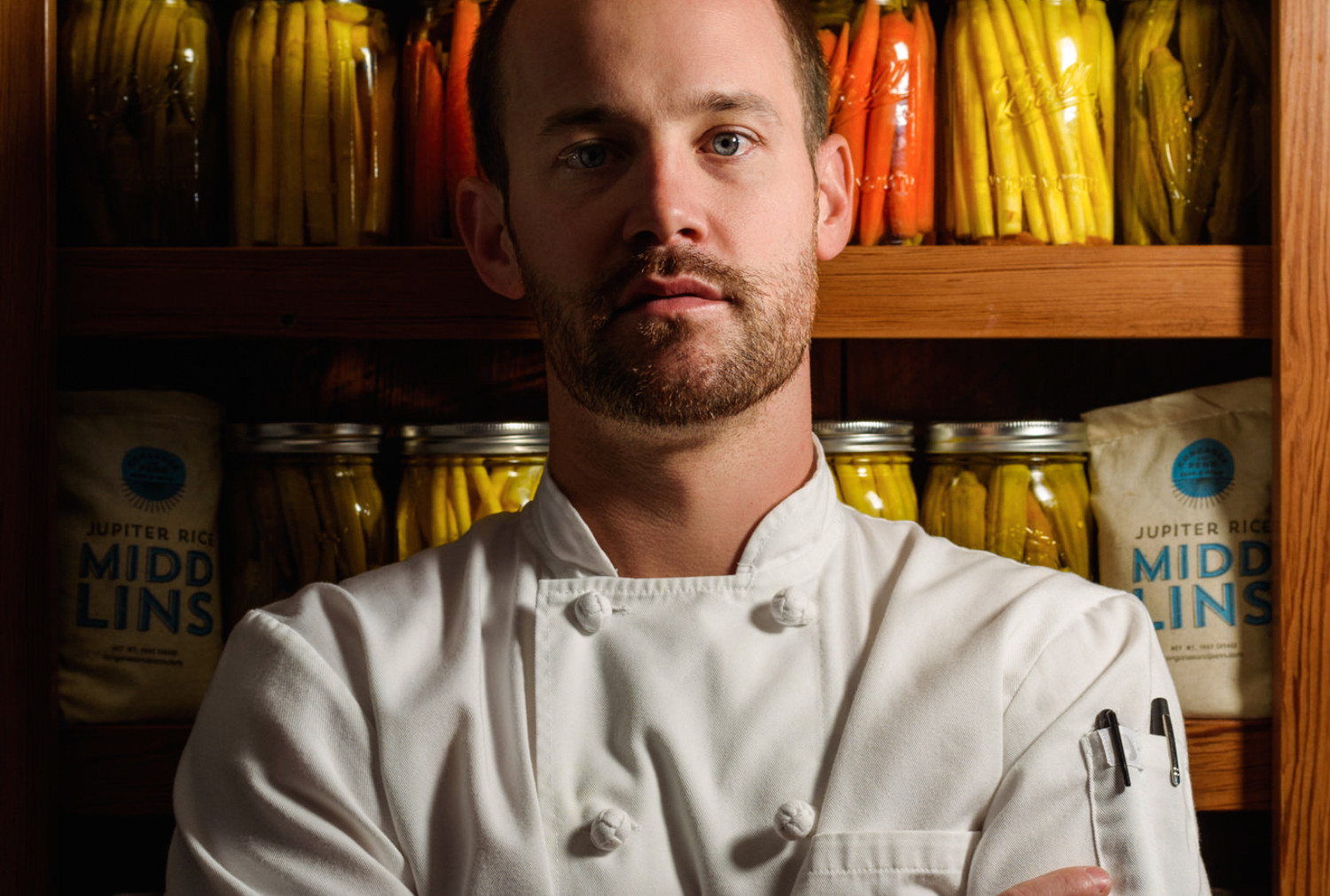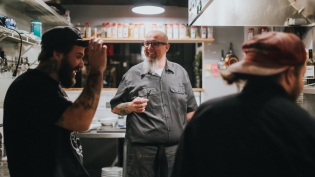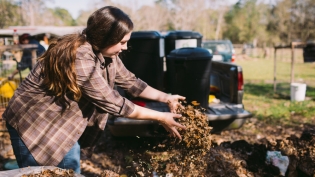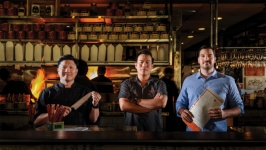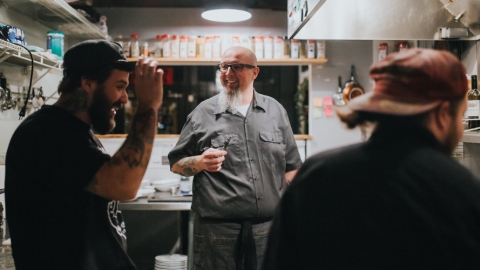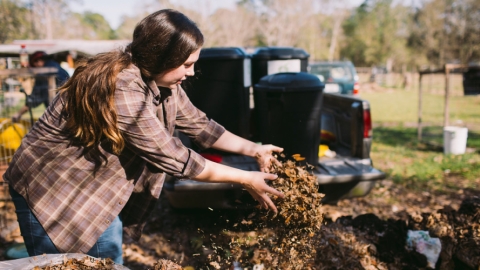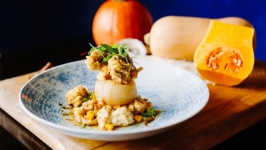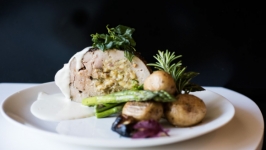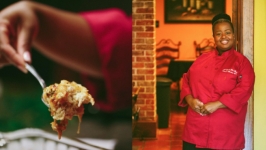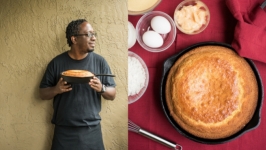Industry Interview: Chef Brian Whittington
Brian Whittington, a James Beard-nominated chef, started in St. Augustine at the South Beach Grill as a dishwasher, then eventually helped launch Zhanras, Rhett’s and Coquina Beach, before going on to Jacksonville’s Restaurant Orsay in 2011 after culinary school. He recently opened Preserved Restaurant in the Historic Lincolnville neighborhood of St. Augustine. We caught up with Chef Whittington to get his thoughts on the role food plays in economic development and community.
Why did you come back to St. Augustine to open Preserved in Lincolnville?
I went to Jacksonville to work because I was frustrated with the dining scene in St. Augustine. It felt like trying to serve quality ingredients wasn’t able to be done back then, and a big thing for me was returning do what I wanted: provide quality service, serve food with local ingredients and highlight what’s going on here.
The opportunity to open Preserved, in this space, with the history of this building was compelling. I originally said no to it. But I talked to some people about St. Augustine and looked at the logistics. The negative history of this location was extremely concerning to the city commission, and this corner was a major problem. The market here before had a pretty bad reputation, and it gave the impression that Lincolnville was a bad area. I had multiple meetings with commissioners to see what they wanted to do to revive this location and whether it matched up with what I wanted to do. We talked about my target clientele and how to fit into the neighborhood.
There’s been an evolution in St. Augustine over the last 5 or 6 years, to say the least. Even the skillset of line cooks I hired is now better than when I left. There’s been a push from chefs to source from local farmers, and we’ve seen new farmers come in. It’s not just the chefs or cooks, farmers are working to meet the demand too, which is allowing me to do what I originally wanted six years ago.
What is the significance of the name of the restaurant?
During the build-out process, because the building is historic, there was a big push to preserve as much as possible. The other thing was a tie-in to the neighborhood; trying to preserve the good things that are going on. The historical significance of this neighborhood has been dramatically overlooked, and a lot of businesses are starting to recognize that. On the food side, we pickle and cure seasonal produce to have it throughout the year. It's preserved.
How do you view the use of food for neighborhood revitalization? The months leading up to opening the restaurant, the amount of traffic we saw coming through wasn’t a lot. It’s amazing how much more traffic we've seen since we opened. The Ice Plant, the Blue Hen, they’re also bringing people back into this neighborhood. People now see the historic plaques and buildings and they hear trolleys talking about Martin Luther King Jr.. It helps people understand what happened in Lincolnville. It's not just downtown St. Augustine that’s historic.
How do food and drink contribute to the development of a sense of community?
I think our presence is good for the community. We had people come in while we were getting set up, saying I was coming in to do upscale food, which they didn’t want. They said we were going to live off tourism. But honestly, what we are trying to do is get locals in; people who want to invest in the community and who have influence in the area. We want to do what we can to be part of this neighborhood and help in its restoration and revitalization. Hopefully, we’re encouraging people to look around and think about what is going on here, now and in the past.
What restaurants or other businesses do you see as models for creating a sense of place?
I think the Ice Plant and the St. Augustine Distillery proved you could bring a solid business into this area and do well. I love the Floridian too. I think they are the purest form of Florida-style restaurant and they are very true to what they want to do. They are probably one of the leading restaurants here in town for sourcing local.
How does your selection of vendors at Preserved reflect your commitment to supporting the local food system?
We want to be able to connect to the people who are providing the food before we touch it. Having that connection, to actually talk to local farmers, that’s very important to us. We try to have interactions with as many of our farmers as possible. When you get staff to understand where our food comes from, there is a very different interaction at the table. They talk about the products and it's more authentic; it's exciting to explain where something comes from. They can say “I was on the farm, I touched the grains of rice on the plants, I know what this is and I know why they do it.”
What is your vision for your role in the neighborhood?
Part of my role is to make sure every line cook and every front of the house staff member here can fully respect the process of food production. Starting with that small group of people here in the restaurant, the idea slowly gets back out into the neighborhood. Staff talk about area farms and spread the concept. It starts to build a sense of pride in sourcing local and supporting our community.
What can our local food industry could do to help foster sustainable development of our region?
Do what you can to support as much local as possible. If you really believe in supporting local and you really believe in farmers, you can’t give in to the forces pushing you to become something you don’t want to be. Also supporting the restaurants that are doing the same is important, so we attract more restaurants with the same standards and beliefs. It takes a group of restaurants to support, not only farmers, but each other. We need to have a big picture view instead of battling one another. There can be friendly competition, but at the same time, it’s pretty important to make sure we all stay on the same page


